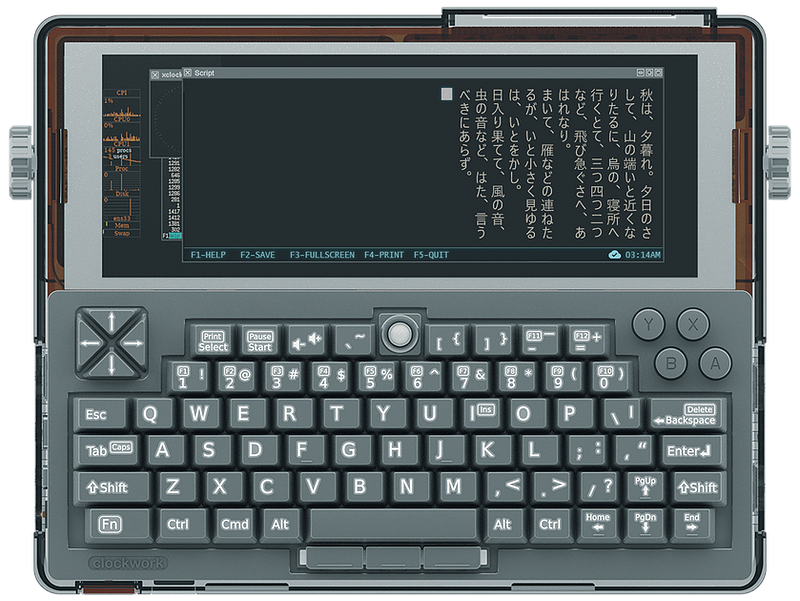
Our team really likes both retro devices and modern productive gadgets that can be used at work and at home. And if these two directions can be combined, it is generally ideal.
The other day I saw just such a device called DevTerm. It has a modular design (we wrote about modular devices , by the way), retro style and open to all hardware and software. Under the cut - a description of the device and its capabilities. While you are reading, we are thinking about ordering this device ...

Characteristics
The computer is equipped with a 6.8-inch color display with a resolution of 1280 * 480 pixels. The platform here is ClockworkPi v3.14 board with a slot for single board. The computer is compatible with five different Compute modules, whose specifications start from 1GB of RAM and a quad-core ARM Cortex-A53 processor up to 4GB of RAM and an eight-core Cortex-A72 and Cortex-A53 cores. As for the internal memory, the developers tested the device with a maximum of 256 GB drives. Most likely, there will be no problems with more capacious media.
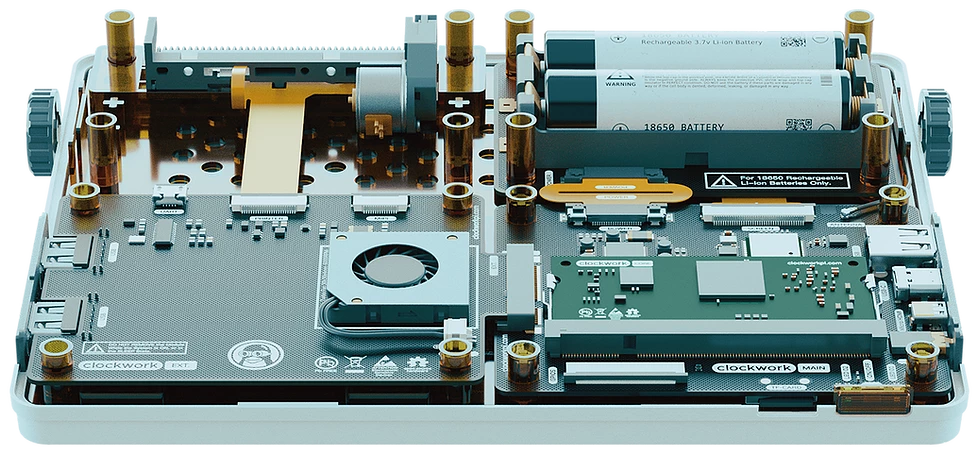
In addition, this PC has:
- PMU chip that supports full battery charging management.
- Wireless communication modules 5G-WIFI (802.11ac) + Bluetooth 5.0.
- Sensitive antenna.
- 3 USB 2.0 ports, interface for keyboard module.
- USB-C port for charging.
- TF card slot.
- 40-pin MIPI interface for display connection.
- Micro-HDMI.
- Headphone jack.
- Audio system (stereo).
- 40-pin GPIO interface.
- 52-pin interface for connecting expansion modules.
- Standard DDR2-SODIMM interface, which is used to connect CPI v3.14 to the main module. A photo of the module with a processor and a RAM chip is below.
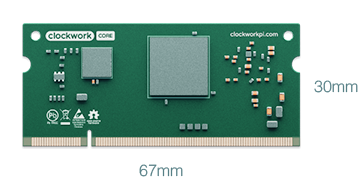
The diagrams and design of the system are distributed under the GPL v3 license, you can download it all on GitHub.

Expansion modules
The developers have thought of a lot. The functions of the main PC can be expanded by installing expansion cards. Here is one of them.
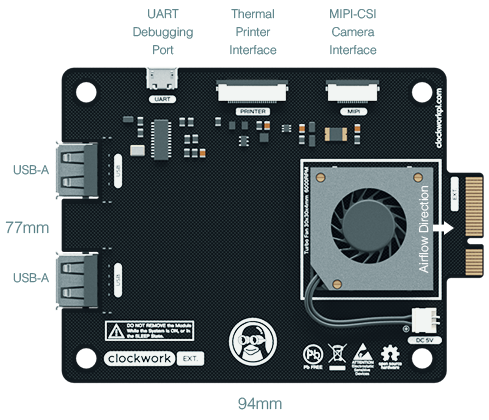
The board contains connectors and ports for connecting a camera, USB devices, a cooler, a thermal printer module, speakers, plus a USB-UART for debugging.
Boards with 4G / 5G modules, an AI accelerator, a radio module, an oscilloscope, an EEG / ECG reader and even a microscope module are currently being developed or have already been developed.
Thus, the device is suitable not only for developers, but also for representatives of other professions. Depending on the needs for functionality here and now, the user can install the appropriate module, getting the necessary features.

Screen and keyboard
These modules are fully functional. As for the screen, despite the non-standard size, it is quite comfortable and capable of displaying both text and images.
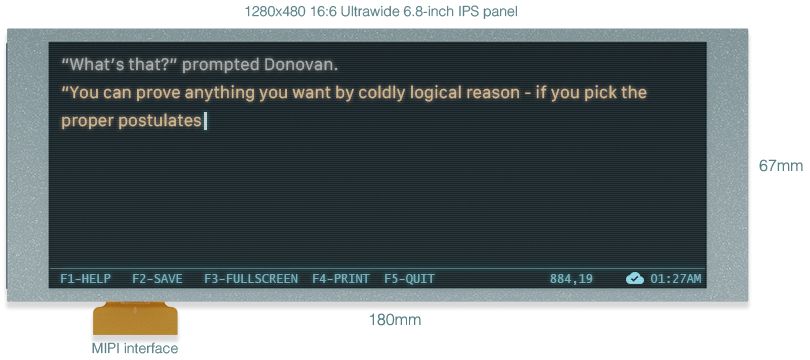
It somewhat resembles the consoles from Fallout 4. Remember those computers that were scattered around the locations here and there?
Keyboard size - 65% of the standard. There are 67 keys in total. There is a trackball and three buttons for mouse operation. There are also gamepad buttons - maybe someone wants to play a classic retro game, so all this comes in handy.
The keyboard is fully compatible with ARM Cortex-M3, and therefore with Arduino STM32. The debug port allows you to modify the functionality of the keyboard. It is connected without loops, using the POGO Pin connector.
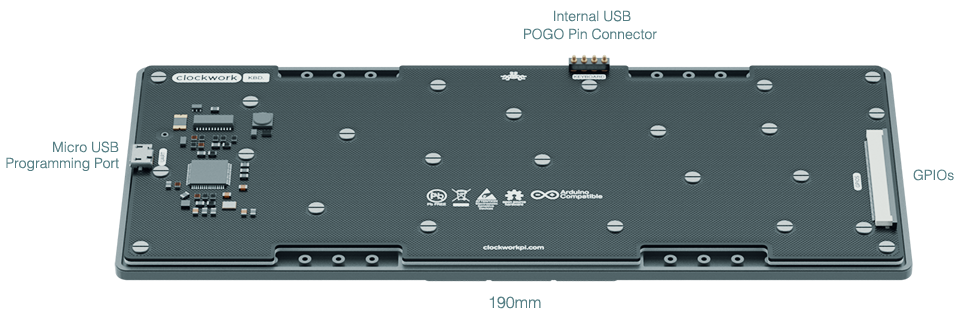
Battery module

Yes, at last someone has built not a proprietary battery, but a module for standard 18650 cells. This is a very cool solution that would be worth adopting for other developers. The batteries can be changed even while working with the system. Of course, not all at once, but in turn.
Thermal printer
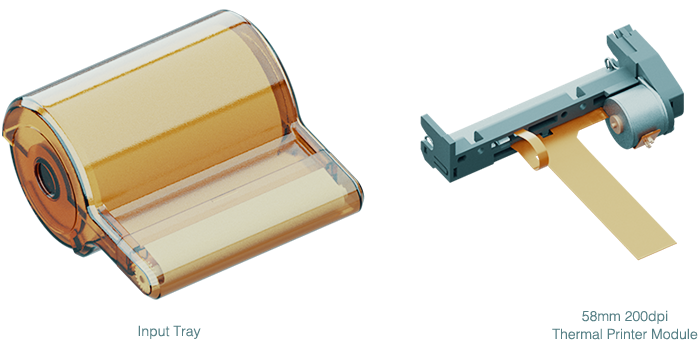
Finally, let's talk about a thermal printer that prints on cash register paper. That strange thing on the top of the PC that you can see in the photographs is just a thermal printer and a slot for placing a roll of paper. What can I say, a very convenient solution. You won't be able to print full documents, but notes, drawings, plans, hardware reports, results of calculations or diagnostics are quite.
What can be said about this device? It is ideal for hardware lovers of all stripes. This is not just a toy, but quite a working tool that can be carried with you or left on the table. Moreover, the developers are planning to release game modules that will allow loading old classic games. Modularity makes it possible to add any functions, and expansion cards will be supplied not only by developers - third-party authors can join the project without restrictions, releasing their own variants of modules. The entire project is open, both hardware and software, so you just need to comply with the license terms, which do not have many restrictions.
As for the purchase, so far only pre-order is available, the devices will be sent out next year. All orders are planned to be dispatched by April 2021.
